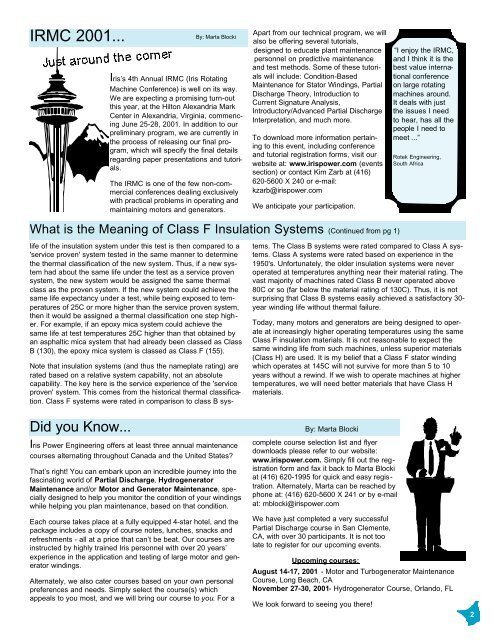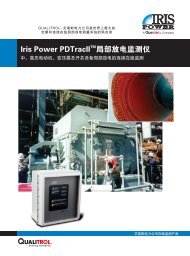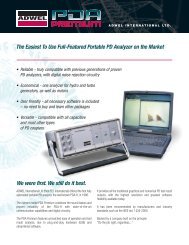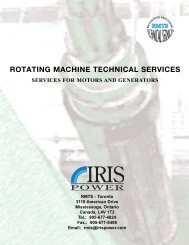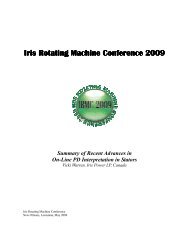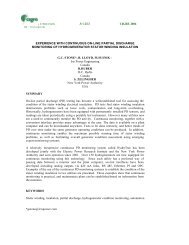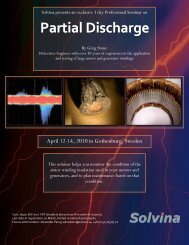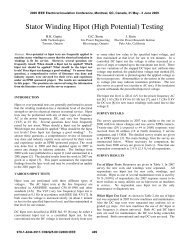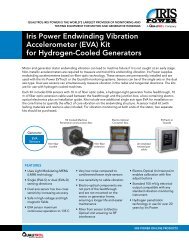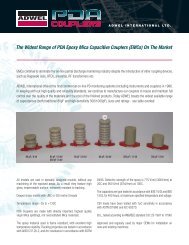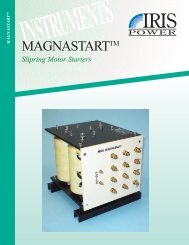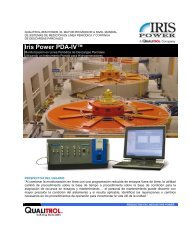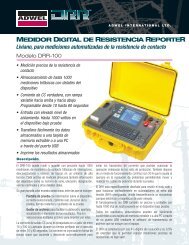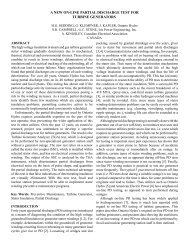to download PDF - Iris Power Engineering
to download PDF - Iris Power Engineering
to download PDF - Iris Power Engineering
You also want an ePaper? Increase the reach of your titles
YUMPU automatically turns print PDFs into web optimized ePapers that Google loves.
IRMC 2001...<br />
By: Marta Blocki<br />
<strong>Iris</strong>’s 4th Annual IRMC (<strong>Iris</strong> Rotating<br />
Machine Conference) is well on its way.<br />
We are expecting a promising turn-out<br />
this year, at the Hil<strong>to</strong>n Alexandria Mark<br />
Center in Alexandria, Virginia, commencing<br />
June 25-28, 2001. In addition <strong>to</strong> our<br />
preliminary program, we are currently in<br />
the process of releasing our final program,<br />
which will specify the final details<br />
regarding paper presentations and tu<strong>to</strong>rials.<br />
The IRMC is one of the few non-commercial<br />
conferences dealing exclusively<br />
with practical problems in operating and<br />
maintaining mo<strong>to</strong>rs and genera<strong>to</strong>rs.<br />
Apart from our technical program, we will<br />
also be offering several tu<strong>to</strong>rials,<br />
designed <strong>to</strong> educate plant maintenance<br />
personnel on predictive maintenance<br />
and test methods. Some of these tu<strong>to</strong>rials<br />
will include: Condition-Based<br />
Maintenance for Sta<strong>to</strong>r Windings, Partial<br />
Discharge Theory, Introduction <strong>to</strong><br />
Current Signature Analysis,<br />
Introduc<strong>to</strong>ry/Advanced Partial Discharge<br />
Interpretation, and much more.<br />
To <strong>download</strong> more information pertaining<br />
<strong>to</strong> this event, including conference<br />
and tu<strong>to</strong>rial registration forms, visit our<br />
website at: www.irispower.com (events<br />
section) or contact Kim Zarb at (416)<br />
620-5600 X 240 or e-mail:<br />
kzarb@irispower.com<br />
We anticipate your participation.<br />
“I enjoy the IRMC,<br />
and I think it is the<br />
best value international<br />
conference<br />
on large rotating<br />
machines around.<br />
It deals with just<br />
the issues I need<br />
<strong>to</strong> hear, has all the<br />
people I need <strong>to</strong><br />
meet ...”<br />
Rotek <strong>Engineering</strong>,<br />
South Africa<br />
What is the Meaning of Class F Insulation Systems (Continued from pg 1)<br />
life of the insulation system under this test is then compared <strong>to</strong> a<br />
'service proven' system tested in the same manner <strong>to</strong> determine<br />
the thermal classification of the new system. Thus, if a new system<br />
had about the same life under the test as a service proven<br />
system, the new system would be assigned the same thermal<br />
class as the proven system. If the new system could achieve the<br />
same life expectancy under a test, while being exposed <strong>to</strong> temperatures<br />
of 25C or more higher than the service proven system,<br />
then it would be assigned a thermal classification one step higher.<br />
For example, if an epoxy mica system could achieve the<br />
same life at test temperatures 25C higher than that obtained by<br />
an asphaltic mica system that had already been classed as Class<br />
B (130), the epoxy mica system is classed as Class F (155).<br />
Note that insulation systems (and thus the nameplate rating) are<br />
rated based on a relative system capability, not an absolute<br />
capability. The key here is the service experience of the 'service<br />
proven' system. This comes from the his<strong>to</strong>rical thermal classification.<br />
Class F systems were rated in comparison <strong>to</strong> class B systems.<br />
The Class B systems were rated compared <strong>to</strong> Class A systems.<br />
Class A systems were rated based on experience in the<br />
1950's. Unfortunately, the older insulation systems were never<br />
operated at temperatures anything near their material rating. The<br />
vast majority of machines rated Class B never operated above<br />
80C or so (far below the material rating of 130C). Thus, it is not<br />
surprising that Class B systems easily achieved a satisfac<strong>to</strong>ry 30-<br />
year winding life without thermal failure.<br />
Today, many mo<strong>to</strong>rs and genera<strong>to</strong>rs are being designed <strong>to</strong> operate<br />
at increasingly higher operating temperatures using the same<br />
Class F insulation materials. It is not reasonable <strong>to</strong> expect the<br />
same winding life from such machines, unless superior materials<br />
(Class H) are used. It is my belief that a Class F sta<strong>to</strong>r winding<br />
which operates at 145C will not survive for more than 5 <strong>to</strong> 10<br />
years without a rewind. If we wish <strong>to</strong> operate machines at higher<br />
temperatures, we will need better materials that have Class H<br />
materials.<br />
Did you Know...<br />
<strong>Iris</strong> <strong>Power</strong> <strong>Engineering</strong> offers at least three annual maintenance<br />
courses alternating throughout Canada and the United States?<br />
That’s right! You can embark upon an incredible journey in<strong>to</strong> the<br />
fascinating world of Partial Discharge, Hydrogenera<strong>to</strong>r<br />
Maintenance and/or Mo<strong>to</strong>r and Genera<strong>to</strong>r Maintenance, specially<br />
designed <strong>to</strong> help you moni<strong>to</strong>r the condition of your windings<br />
while helping you plan maintenance, based on that condition.<br />
Each course takes place at a fully equipped 4-star hotel, and the<br />
package includes a copy of course notes, lunches, snacks and<br />
refreshments - all at a price that can’t be beat. Our courses are<br />
instructed by highly trained <strong>Iris</strong> personnel with over 20 years’<br />
experience in the application and testing of large mo<strong>to</strong>r and genera<strong>to</strong>r<br />
windings.<br />
Alternately, we also cater courses based on your own personal<br />
preferences and needs. Simply select the course(s) which<br />
appeals <strong>to</strong> you most, and we will bring our course <strong>to</strong> you. For a<br />
By: Marta Blocki<br />
complete course selection list and flyer<br />
<strong>download</strong>s please refer <strong>to</strong> our website:<br />
www.irispower.com. Simply fill out the registration<br />
form and fax it back <strong>to</strong> Marta Blocki<br />
at (416) 620-1995 for quick and easy registration.<br />
Alternately, Marta can be reached by<br />
phone at: (416) 620-5600 X 241 or by e-mail<br />
at: mblocki@irispower.com<br />
We have just completed a very successful<br />
Partial Discharge course in San Clemente,<br />
CA, with over 30 participants. It is not <strong>to</strong>o<br />
late <strong>to</strong> register for our upcoming events.<br />
Upcoming courses:<br />
August 14-17, 2001 - Mo<strong>to</strong>r and Turbogenera<strong>to</strong>r Maintenance<br />
Course, Long Beach, CA<br />
November 27-30, 2001- Hydrogenera<strong>to</strong>r Course, Orlando, FL<br />
We look forward <strong>to</strong> seeing you there!<br />
2


